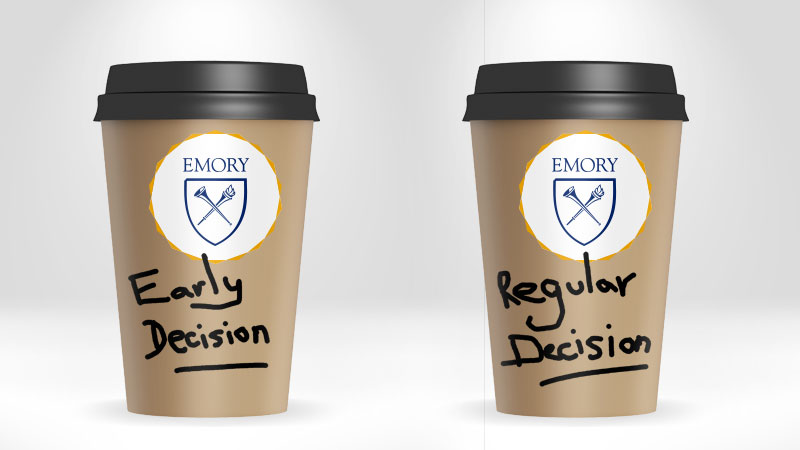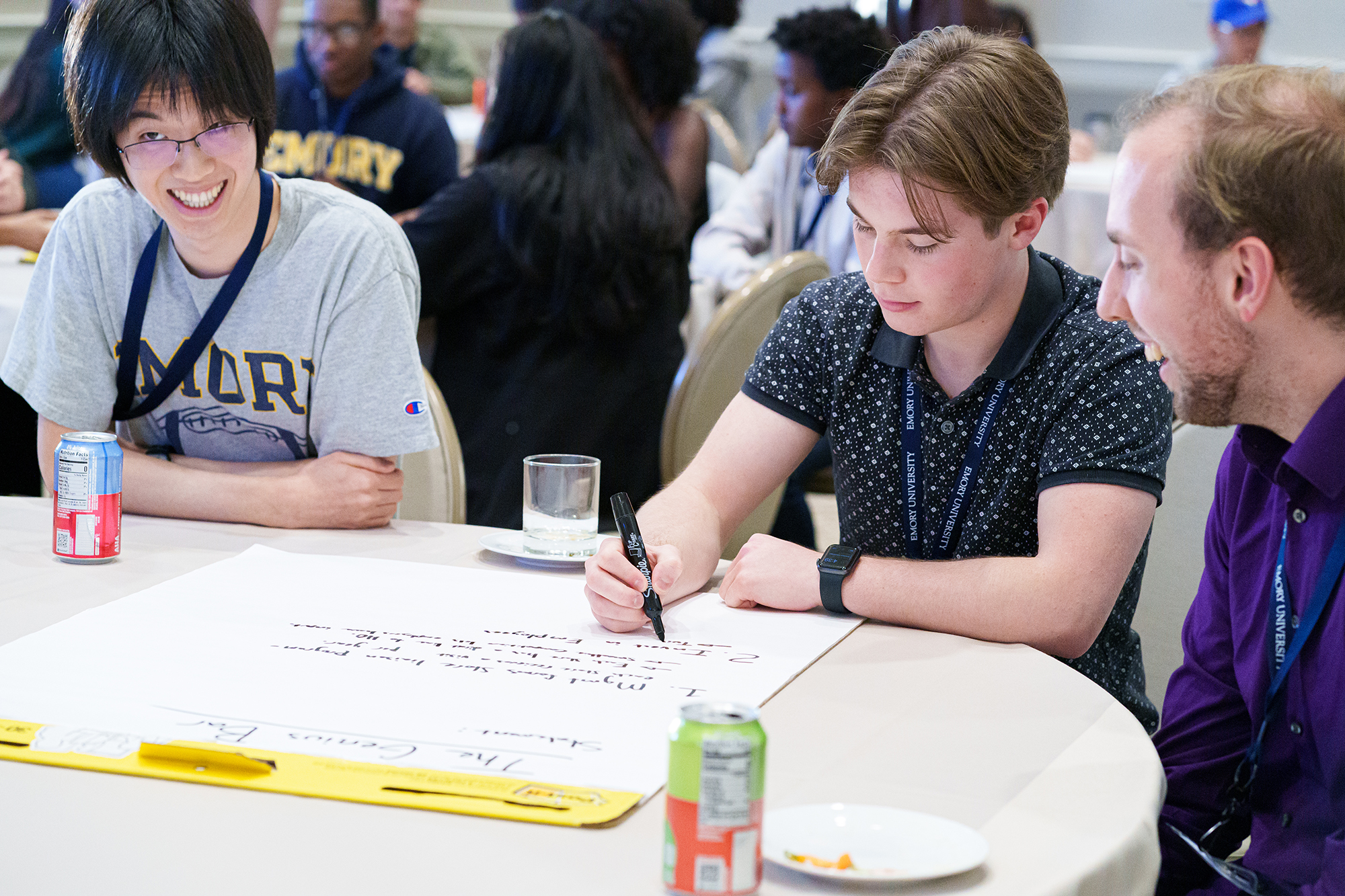Emory's merit-based scholarships empower students. Beyond prestige and financial aid, Emory University’s Scholar Programs provide…
To ED or not to ED, that is the question!

Updated October 17, 2021
One of the most common questions we get this time of year is “Should I apply Early Decision?”
One of the decisions high school seniors are considering is whether to make the binding commitment that goes along with applying EDI and EDII. We hope to provide you with some direction on how to tackle this important question and offer some advice on whether to ED or not to ED.
Start with our Early Decision webpage to become familiar with how the ED agreement works, read about our two ED plans (EDI and EDII), and decide whether you want to apply to ED to Emory College, Oxford College, or both campuses. The deadlines to submit application material for each plan could help determine your choice:
Early Decision I: Deadline is November 1st
Early Decision II: Deadline is January 1st
You will also want to read about the Regular Decision Admission Plan and the Questbridge and Emory Scholars Programs as you are making decisions about which application plan to choose. Our goal is to provide you with as much information as you need to make the best decision for yourself.
Who should apply Early Decision?
Simply put, if Emory University is your definitive first choice, and you are ready to make the commitment, then Early Decision is probably for you. Either ED application plan is binding for students who definitely know that Emory is their first pick. This is for the students who have done their research, and for all the right reasons, they are confident in their decision. ED is for students who have fallen in love with our campus and our mission. If Emory is the school that you measure all other schools by, and those schools always fail in comparison, then we would strongly encourage you to consider ED.
Who should NOT apply Early Decision?
Perhaps this is obvious, but students who do not have a clear first choice school and want to weigh their options should not apply Early Decision to any school. Not everyone knows exactly what they want this early in their senior year, and that is 100% okay. Don’t ever feel forced to apply early somewhere, especially if you are someone who likes to take their time making a decision.
It’s important to consider financial aid as well. If you are admitted ED, you do not have the opportunity to compare financial aid offers from more than one university. If financial aid is a major factor in whether you can attend a university or not, then think carefully about whether you should apply ED or not. (See the next question for more info about how this works.)
We also recommend against applying ED for students who are only considering the binding commitment for tactical reasons. Students focused on just “getting in” and students who view applying ED solely as a strategic move, put simply, shouldn’t. Applying to colleges should not be seen as winning a game, and students who over-analyze statistical data about ED are approaching the process from the wrong direction. Selecting an ED admission plan should be about fit, 100% of the time.
Are there any disadvantages to apply ED?
If there is a disadvantage to applying ED, it has to do with financial aid. We use precisely the same methods for calculating eligibility for aid no matter what application plan you choose, but the disadvantage is that if you are admitted ED, you do not have the opportunity to compare financial aid offers from any other university. Each institution has its own way of determining how much a family can reasonably pay for college, and the outcome of that process is only revealed after you are offered admission. When admitted ED, you just get the one offer of financial aid from your ED institution. If you’re looking for the best financial aid package from multiple school offers, then consider this during your decision process.
Are there advantages to applying Early Decision?
Yes, there are definitely benefits to applying to ED. The earlier acceptance timeline is a clear advantage. ED applicants learn of their decision earlier. If admitted, their college search is complete, and they can focus on successfully finishing high school. If not admitted, though disappointing, students can move on and focus on other schools that would also be a good fit.
Another advantage is that during the ED evaluation process, Admission staff aren’t yet under the pressure of reading through hundreds and hundreds of applications. When the Admission Committee is evaluating applications during the early process, they have fewer applications overall to consider.
While the ED application pool is smaller, that does not mean there is a competitive advantage.
The phrase “competitive advantage” leads to a conclusion that it is easier to get in when applying ED. There are benefits to applying ED, but it is not easier to be admitted. The Admission Committee review process is the same during the early evaluation process as it is during the review of RD applicants—both in terms of academic metrics and holistic measures.
If I do not apply ED, do I still have a chance to be admitted?
We strive to hold at least half (if not more) of our admitted student spots for Regular Decision (RD) applicants. Students who apply RD are held to the same academic standards, and our admission evaluators are just as excited to read RD applications. Don’t feel forced to apply ED fearing that your application will be passed over. Great students are admitted during RD every year, and we would not have a complete class without our RD applicants!
Regardless of the application plan you choose, know that the Admission Committee desires to get to know you for who you really are through the application process. You can read more about how the Admission staff reviews your application by reading the Holistic Application Review blog. Feel free to share about what excites you, challenges you, drives you to go for broke and reach for more in the comments below. We hope your college aspirations lead you to Emory University, and please know we are here to assist you in the process.
Don’t hesitate to connect with us by posting a comment to this blog, tweeting us @emoryadmission, or emailing us at admission@emory.edu.



How can I apply and please help me
This is my email: Wahidrahmani1996@gmail.com
Please visit https://apply.emory.edu/apply/index.html to learn more about how to apply, and important deadlines. The Application will be available in late August/early September.
If I apply to RD now and if I want to change it to ED by end of January will I be able to do it?
Hi, Su- we’re back in the office, and will send you a reply to your question via email
Hi,
I am applying by 15th November 2020 ( for FALL 2021 Undergraduate freshman ) in Scholarship Program.
If I am applying now in Regular Decision. Later If I wish to convert it to Early Decision-II ( deadline 1st Jan 2021 ). can I change from RD to ED-II and what will be deadline for the same.
Request to revert ASAP, as the deadline is 15th Nov 2020.
Thanks,
Bimal Patel
Hi Bimal, you are absolutely allowed to change your application plan from RD to ED2 or the other way around after you submit on Nov. 15. It’s best to contact our office directly if you have changes to the application plan or the application itself: 404-727-6036 or admission@emory.edu.
Hello there,
In your website, you state that ED I applicants can still apply to non-binding EA programs elsewhere. Does this mean that I can apply to both ED I at Emory and EA at some other college?
Thanks in advance!
Hi Paul,
Thanks for your question! Yes, you can apply ED1 to Emory and EA to another university as long as the EA schools are actually non-binding and have no other regulations. For example, some schools have Restrictive Early Action that prohibits students from applying to any school under an ED plan. Our advice is to read the EA plan regulations carefully to see what they allow and what they do not. Please let me know if you have any other questions.